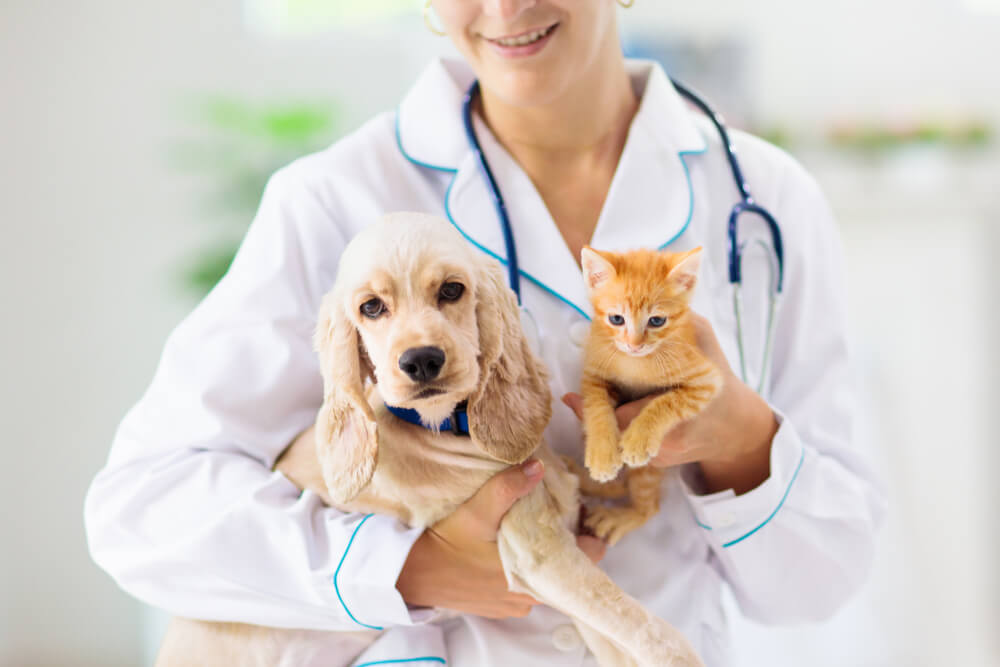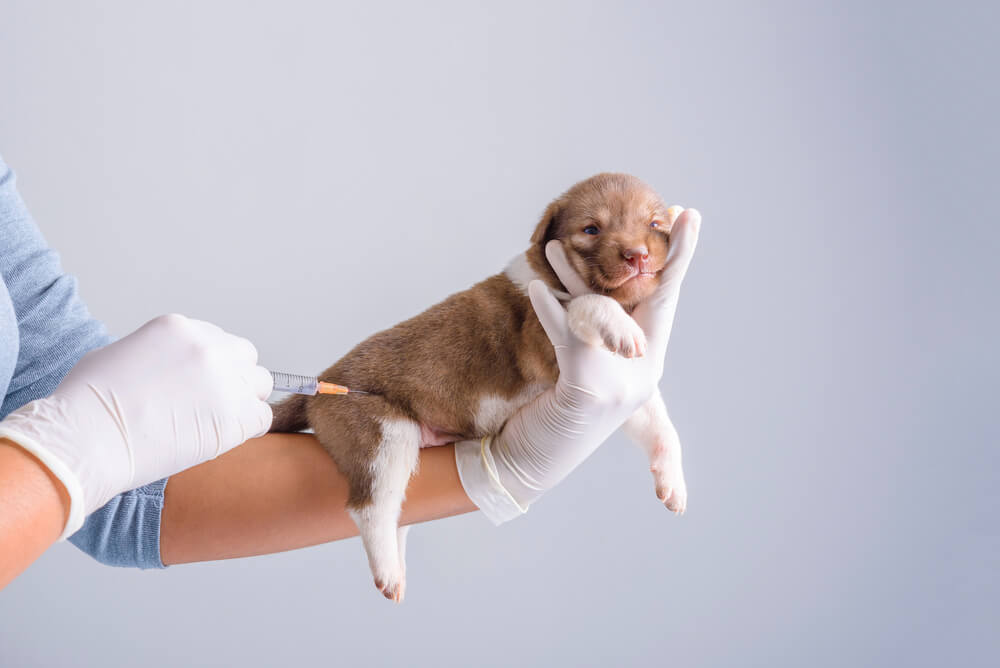What to Consider when Taking Your Pet to the Vet for the First Time

All pet owners want to provide the best possible care for their pets to safeguard their overall health and well-being. And, just like humans, animals also require ongoing checkups. So, if a new furry member of the family will soon be arriving, keep reading to find out what to look out for when taking your pet to the vet for the first time.
Adopting a puppy or a kitten is a decision that comes with happiness, but also with great responsibilities. Because when it arrives in our arms, it’s essential that we take it to a veterinary center for a superficial check-up as soon as possible to get the appropriate vaccinations and establish a plan for future visits.
4 recommendations for taking your pet to the vet for the first time
When we adopt a dog or cat, we’re not only taking care of their company and affection, but also of their needs and requirements. If you’ve just given a new home to one of these animals, remember that they not only need love and affection (fundamental components), but also dedication and devotion.
Here are some tips when you take your pet to the vet for the first time.
1. Go to reliable veterinary health centers

Just as we go to the best hospitals to take care of our children’s health, it’s essential to place our trust in quality veterinary centers to ensure the safety of our pets. For this reason, the first recommendation is to look for the right veterinarian in advance and, in this way, know from their experience how much a vet visit costs.
Keep in mind that personalized and quality care isn’t usually cheap, but it’s better to go to certified professionals than to veterinarians of dubious reputation. And since vet visits should be scheduled at least once a year, considering pet health insurance is a great idea to reduce costs.
2. Don’t wait too long to go to the veterinarian
Whether the dog or cat was born at home or adopted, it’s very important to take them to the vet as soon as possible for a routine evaluation. And keep in mind that puppies should be dewormed between 21 and 30 days of age, so it’s very important to make the first visit during that time. Not only for health tests, but also so that they can go outside with peace of mind.
Ideally, during that first checkup, the veterinarian will check the animal’s eyes, ears, mouth, and skin to conclude that everything’s in order. However, there will be times when stool or blood tests will be necessary to rule out possible future ailments.
3. Plan your pet’s vaccination schedule

According to studies on vaccination guidelines for dogs and cats, vaccinations should be administered between 6 and 9 weeks of age. This is because, before that time, the newborn’s immune system isn’t yet developed and is protected by passive maternal immunity. So, planning the vaccination schedule with your veterinarian is an excellent idea.
Among the most recommended and used vaccines for dogs are those against parvovirus, distemper, canine infectious hepatitis, leptospirosis, and rabies (which is mandatory). Cats need the essential supply of rabies vaccine and feline triple vaccine (feline parvovirus, feline herpesvirus, and feline calicivirus vaccine). All of the above vaccines should be boosted at one year and every few years.
4. Resolve all the doubts you may have
Taking care of a puppy’s health has its special particularities. Studies have confirmed that among newborn animals, there are still more deaths than those observed among human infants. Therefore, during this first evaluation, it’s essential to identify the medical condition of the newborn and to resolve all possible doubts regarding its care.
For example, from when the right time is to wean your pet to what’s the best food for its breed and size. So, take advantage of the veterinarian’s presence and ask them everything you need to. Keep in mind that, during their first months, both dogs and cats require good nutrition and constant rest. So, try to get as much information as possible.
Take your pet to the vet for the first time as soon as possible
Our pet’s first check-up is the way to make sure that everything’s in order and that it’s in good health. In addition, it’s the perfect opportunity to establish their vaccination schedule and resolve any doubts that may arise.
Because of this, remember to hire the services of a good veterinary center and comply with all the responsibilities that come with having an animal, from giving it all your love and dedication, to feeding, housing, vaccinations, and recreation.
All pet owners want to provide the best possible care for their pets to safeguard their overall health and well-being. And, just like humans, animals also require ongoing checkups. So, if a new furry member of the family will soon be arriving, keep reading to find out what to look out for when taking your pet to the vet for the first time.
Adopting a puppy or a kitten is a decision that comes with happiness, but also with great responsibilities. Because when it arrives in our arms, it’s essential that we take it to a veterinary center for a superficial check-up as soon as possible to get the appropriate vaccinations and establish a plan for future visits.
4 recommendations for taking your pet to the vet for the first time
When we adopt a dog or cat, we’re not only taking care of their company and affection, but also of their needs and requirements. If you’ve just given a new home to one of these animals, remember that they not only need love and affection (fundamental components), but also dedication and devotion.
Here are some tips when you take your pet to the vet for the first time.
1. Go to reliable veterinary health centers

Just as we go to the best hospitals to take care of our children’s health, it’s essential to place our trust in quality veterinary centers to ensure the safety of our pets. For this reason, the first recommendation is to look for the right veterinarian in advance and, in this way, know from their experience how much a vet visit costs.
Keep in mind that personalized and quality care isn’t usually cheap, but it’s better to go to certified professionals than to veterinarians of dubious reputation. And since vet visits should be scheduled at least once a year, considering pet health insurance is a great idea to reduce costs.
2. Don’t wait too long to go to the veterinarian
Whether the dog or cat was born at home or adopted, it’s very important to take them to the vet as soon as possible for a routine evaluation. And keep in mind that puppies should be dewormed between 21 and 30 days of age, so it’s very important to make the first visit during that time. Not only for health tests, but also so that they can go outside with peace of mind.
Ideally, during that first checkup, the veterinarian will check the animal’s eyes, ears, mouth, and skin to conclude that everything’s in order. However, there will be times when stool or blood tests will be necessary to rule out possible future ailments.
3. Plan your pet’s vaccination schedule

According to studies on vaccination guidelines for dogs and cats, vaccinations should be administered between 6 and 9 weeks of age. This is because, before that time, the newborn’s immune system isn’t yet developed and is protected by passive maternal immunity. So, planning the vaccination schedule with your veterinarian is an excellent idea.
Among the most recommended and used vaccines for dogs are those against parvovirus, distemper, canine infectious hepatitis, leptospirosis, and rabies (which is mandatory). Cats need the essential supply of rabies vaccine and feline triple vaccine (feline parvovirus, feline herpesvirus, and feline calicivirus vaccine). All of the above vaccines should be boosted at one year and every few years.
4. Resolve all the doubts you may have
Taking care of a puppy’s health has its special particularities. Studies have confirmed that among newborn animals, there are still more deaths than those observed among human infants. Therefore, during this first evaluation, it’s essential to identify the medical condition of the newborn and to resolve all possible doubts regarding its care.
For example, from when the right time is to wean your pet to what’s the best food for its breed and size. So, take advantage of the veterinarian’s presence and ask them everything you need to. Keep in mind that, during their first months, both dogs and cats require good nutrition and constant rest. So, try to get as much information as possible.
Take your pet to the vet for the first time as soon as possible
Our pet’s first check-up is the way to make sure that everything’s in order and that it’s in good health. In addition, it’s the perfect opportunity to establish their vaccination schedule and resolve any doubts that may arise.
Because of this, remember to hire the services of a good veterinary center and comply with all the responsibilities that come with having an animal, from giving it all your love and dedication, to feeding, housing, vaccinations, and recreation.
All cited sources were thoroughly reviewed by our team to ensure their quality, reliability, currency, and validity. The bibliography of this article was considered reliable and of academic or scientific accuracy.
- Rubio, A. Martínez Ávila, R. Guzmán Iturbe, H. Chávez Zapata, F. De la Colina, G. Salazar Guevara, J. Ramírez, I. Autrán de Morais, H. & Guerrero, J. (2018). Guías para la vacunación de perros (caninos) y gatos (felinos) en Perú. Revista de Investigaciones Veterinarias del Perú, 29(4), 1463-1474. Recuperado de: https://dx.doi.org/10.15381/rivep.v29i4.15205
- Vassalo FG, Simões CR, Sudano MJ, Prestes NC, Lopes MD, Chiacchio SB, Lourenço ML. (2015). Topics in the routine assessment of newborn puppy viability. Top Companion Anim Med. 2015 Mar;30(1):16-21. doi: 10.1053/j.tcam.2015.02.003. Epub 2015 Mar 3. PMID: 26041592. Recuperado de: https://pubmed.ncbi.nlm.nih.gov/26041592/
This text is provided for informational purposes only and does not replace consultation with a professional. If in doubt, consult your specialist.








